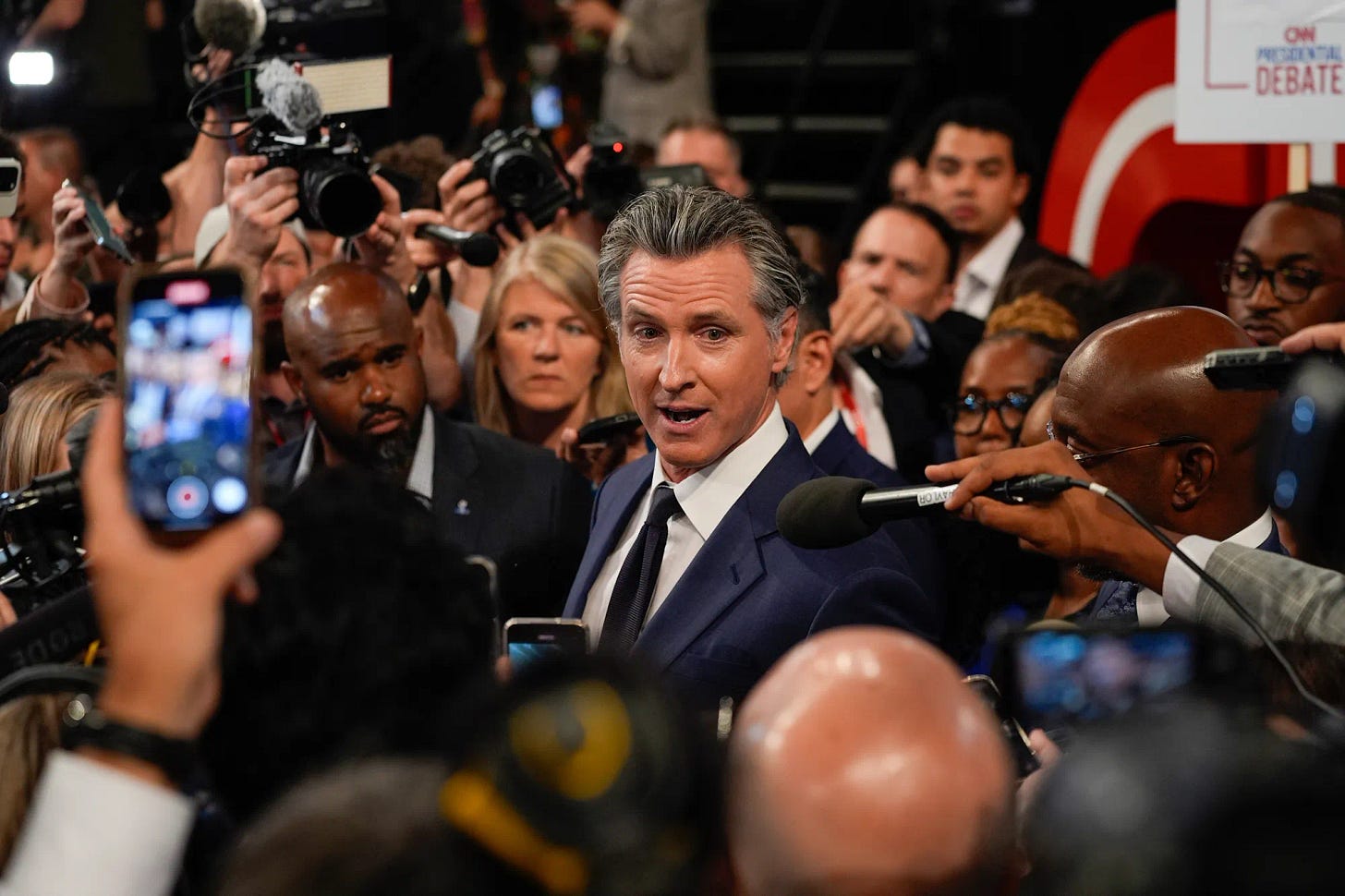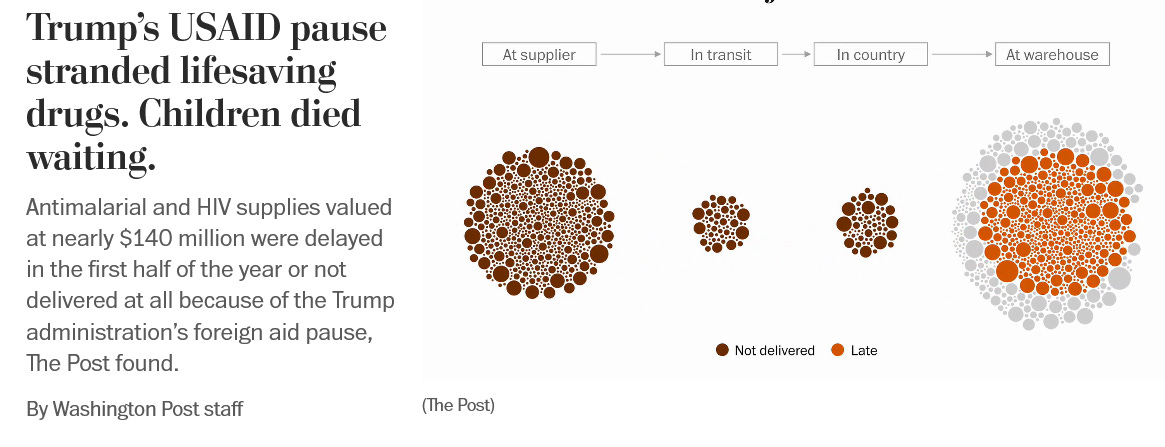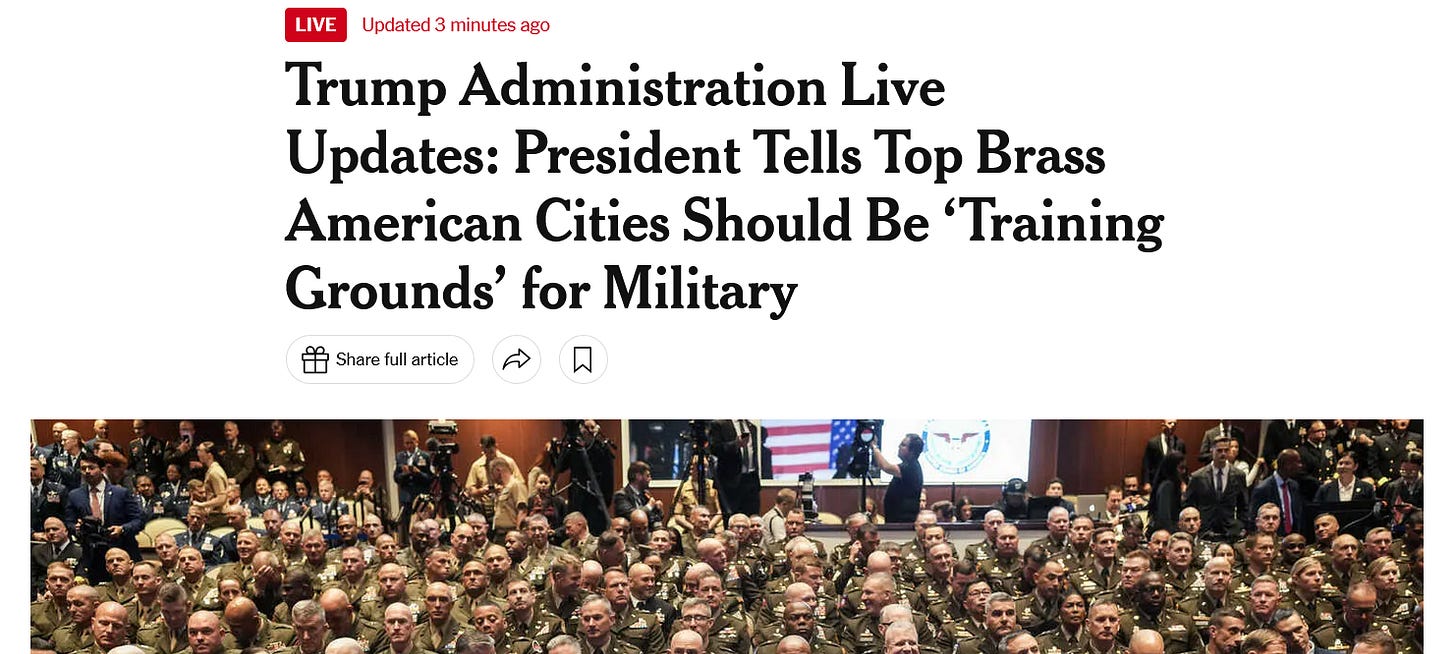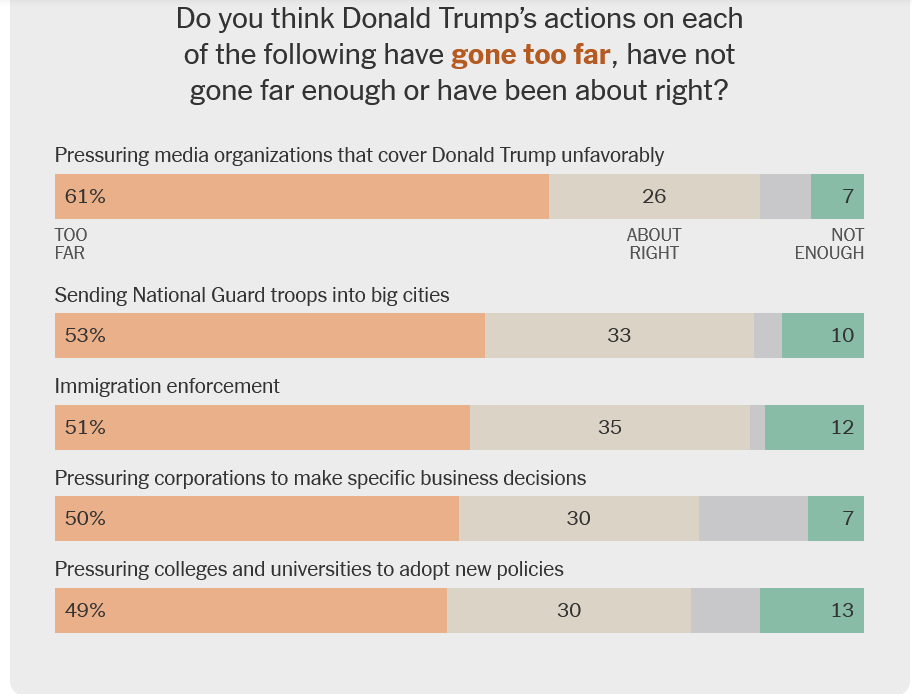Military Leaders Sound The Alarm About Trump's Retreat From The World And Inward Turn, More Notes On Winning The Fall
I'm joining Gov. Newsom today at 1pm ET/10am PT for a live discussion on Substack - join us! Excited for this one....
Morning all. First, some exciting news. I will be joining Governor Gavin Newsom today at 1pm ET/10am for a live conversation on his Substack. Click on this link just before 1pm ET to join us. As folks here know Governor Newsom is an old friend, and I am looking forward to what is certain to be a lively conversation! For those who can’t make it live I will be sharing the a recording later today or tomorrow…..
As Generals Gather In Virginia, Perhaps We Are Learning The Real Reason For The Meeting - Here’s what was the early morning lead story in the Washington Post - Military leaders voice concern over Hegseth’s new Pentagon strategy (gift link). It begins:
Military leaders have raised serious concerns about the Trump administration’s forthcoming defense strategy, exposing a divide between the Pentagon’s political and uniformed leadership as Defense Secretary Pete Hegseth summons top brass to a highly unusual summit in Virginia on Tuesday, according to eight current and former officials.
The critiques from multiple top officers, including Gen. Dan Caine, chairman of the Joint Chiefs of Staff, come as Hegseth reorders U.S. military priorities — centering the Pentagon on perceived threats to the homeland, narrowing U.S. competition with China, and downplaying America’s role in Europe and Africa.
President Donald Trump will attend the abrupt gathering of generals and admirals at Marine Corps Base Quantico, where Hegseth is expected to deliver remarks on military standards and the “warrior ethos,” even as uniformed leaders fear mass firings or a drastic reorganization of the combatant command structure and the military hierarchy.
The debate over the National Defense Strategy — the Pentagon’s primary guide for how it prioritizes resources and positions U.S. forces around the world — is the latest challenge for top military officials navigating the Trump administration’s unorthodox approach to the armed forces.
People familiar with the editing process, who like others spoke on the condition of anonymity to describe sensitive deliberations, described a growing sense of frustration with a plan they consider myopic and potentially irrelevant, given the president’s highly personal and sometimes contradictory approach to foreign policy.
And….
The draft plan has been shared widely with military leaders from the global combatant commands to the Joint Chiefs of Staff, some of whom questioned what its priorities would mean for a force designed to respond to crises around the globe, according to three people familiar with the matter.
Dissent during the drafting process is normal, but the number of officials concerned about the document — and the depth of their criticism — is unusual, several people said.
Caine shared his concerns with top Pentagon leadership in recent weeks, according to two people familiar with the matter.
“He gave Hegseth very frank feedback,” one of the two people said, noting that Pentagon policy chief Elbridge Colby was also included in the discussion. “I don’t know if Hegseth even understands the magnitude of the NDS, which is why I think Caine tried so hard.”
The second person said Caine has tried to get the NDS to remain focused on preparing the military to deter and, if necessary, defeat China in a conflict.
Hegseth and his policy officials have signaled that the Pentagon will withdraw some forces from Europe and consolidate commands in a way that unnerves some U.S. allies, particularly amid Russia’s war with Ukraine and its recent, repeated incursions into NATO airspace. For years, Pentagon strategy has been anchored in the idea that the nation’s best defense was in building and maintaining strong military alliances abroad.
Whatever happens today in Virginia this story is a clear warning from our military leaders that they believe Trump is taking us in a dangerous direction, one that I recently described as “surrender, not war.” It is why standing with Ukraine and our European allies is one of the top 4 items on the Hopium agenda, and something Democrats should be fighting for in the fall budget debate.
Note that the very next story in the Washington Post this morning is this one:
And yes, as expected, Trump made the case to his generals to turn their attention from our adversaries abroad to the enemies within in his speech today, which we all have to believe is the reason this meeting took place (for they were getting resistance):
This is what the Secretary of Surrender, Pete Hegseth, said today about how they intend to attack the enemy here in the US:
“We unleash overwhelming and punishing violence on the enemy. We also don’t fight with stupid rules of engagement. We untie the hands of our warfighters to intimidate, demoralize, hunt, and kill the enemies of our country. No more politically correct and overbearing rules of engagement.”
Our military leadership are right to be alarmed about where all this is going, and it is why we must be doing everything we can to keep soldiers off our streets. More on this tomorrow….
The Chaos Monkeys In The White House Are Choosing To Turn Off All Government Economic Data If The Government Shuts Down - From The NYT (gift link):
The monthly jobs report on Friday is expected to provide crucial evidence to economists, policymakers and investors who are trying to determine whether a slowdown in hiring over the summer continued into the fall, and whether deeper cracks are forming in the foundation of the U.S. labor market.
If, that is, there is a jobs report on Friday at all.
The Bureau of Labor Statistics, which produces the monthly jobs data, will “suspend all operations” if Congress and the president fail to reach a deal to extend funding for the federal government before a Tuesday midnight deadline, according to a contingency plan released by the Department of Labor. Data releases scheduled during a government shutdown “will not be released,” and data collection for future reports will cease, the memo said.
That means a shutdown could delay not only the jobs report on Friday but also other data, including key inflation figures that were set to come out in mid-October. Reports from other agencies, including the Census Bureau and Bureau of Economic Analysis — which are part of the Commerce Department — would also be affected.
The potential lapse in data comes at a particularly critical moment for economists and policymakers, who have been struggling to make sense of conflicting signals about the health of the labor market and the broader economy. Job growth has slowed significantly in recent months, but the unemployment rate has remained low. Measures of consumer spending and some other economic activity have likewise stayed relatively strong.
More Notes On Winning The Fall - Fighting And Winning The Debate About Trump’s Failed Government And Selling Out Of The American People - As we’ve been discussing, we are here now, in the debate we all wanted to have to with Trump, and it is essential that in the coming months, we win it.
In my view, whether we understand it or not, we’ve entered the early stages of the 2026 general election, and we need to grow far more strategic about fighting and winning this big argument with Trump. While picking this early fight around health care is a good way into this broader discussion about what he is doing to the country, our indictment of him simply must broaden and deepen as we go further into this debate; and Democrats must create a more sophisticated and coordinated communications infrastructure to be able to compete with Trump, his information superiority, and his war chest.
We are in a vastly different information and political landscape than any of us have ever faced before, and our strategies and tactics must evolve if we are take advantage of their governing failures, “more for me, less for you” agenda, and deepening unpopularity. The way Governor Newsom has been competing in the information space these past few months is a very good example of the kind of evolution our politics must undergo now.
I have made recommendations on how to organize ourselves better to fight this battle in this memo, Fighting Trump Now - Some Recommendations For Congressional Democrats.
In that memo I also discuss the need for us to develop a clearer national narrative and a rallying cry for the pro-democracy movement. In this talk with Leon Krauze we discuss why we must challenge Trump more forcefully on all fronts 24/7/365, acknowledging that when “strongmen” are not challenged they view it as weakness and a permission to escalate.
In this post I talk about the need for us to understand the centrality of “strong” and “weak” to Trump, and why we also must learn to operate more aggressively and more confidently in the “strong leader, weak leader” domain. The video Trump reposted last night of Leaders Schumer and Jeffries was all about making us weak and him strong.
In this post I argue that we must broaden our argument beyond health care, adding at least tariffs/affordability and threats to democracy, issues voters believe are far more important than health care right now. Here is the four part agenda I think Democrats should be taking into the current budget debate and into 2026:
Roll back Trump’s terrible, illegal tariffs that are re-igniting inflation, driving up prices, shifting the tax burden from the wealthy to working people, hurting small businesses and farmers, reviving tyrannical “taxation without representation,” and alienating governments and people throughout the world
Defend our democracy, rule of law and our liberties by blocking the expansion of ICE, restore due process to our immigration system, defend the 1st Amendment, and end the use of the military on our streets and the occupations of our cities
Fight Trump’s war on science, higher education and our public health; reverse - not delay - the cuts to the ACA and Medicaid; support and co-sponsor Rep. Haley Stevens’ effort to Impeach and remove Robert Kennedy
Stand with Ukraine and our European allies, and far more forcefully challenge Trump’s traitorous efforts to sell out the US and the West to Russia and China
A new NYT poll out this morning confirms what we’ve been seeing in polling over the past few months - there is very little support for his “strongman” authoritarian tactics:
Two recent ads from our side are examples of what an expanded agenda and message frame can look like. Here’s a new ad from a House SuperPAC that talks about rising prices/tariffs, health care, shutdown/chaos and broken promises/betrayal (this one is from AZ-6, the campaign has similar ads in 9 other districts right now):
And here’s the latest ad from Gov. Newsom and Yes on 50 - tariffs/costs, health care, betrayal, and threat to democracy:
Trump and his agenda are deeply unpopular, his government is failing, and he is in physical and cognitive decline. We are in the fight with him we all wanted to have but in my view we must now to do two things to strengthen our position and make it more likely we win: 1) broaden our argument and create a national rallying cry 2) create a more coordinated and sophisticated communications infrastructure.
Now, Let’s Get To Work Everyone!!!!!!!!!!!!
Today is the final day of the 3rd quarter, a very big filing deadline. Do what you can to help our candidate close strong by donating before midnight tonight!
Winning The Fall - Support Our November, 2025 Candidates and Yes On 50
Mikie Sherrill NJ Gov (2025) - $250,000 goal, $92k raised - Donate | Learn More | Volunteer | Watch my new interview with Rep. Sherrill, read my new post about Sherrill’s sturdy polling lead
Abigail Spanberger VA Gov (2025) - $250,000 goal, $200k raised - Donate | Learn More | Volunteer | Watch my interview with Abigail Spanberger
Yes on 50 (CA) - $50,000 goal - Donate | Learn more, volunteer | Sign Up For CA Dem Party Daily Phonebanks
Hopium members in CA/NJ/PA/VA - please vote on Day 1, or as early as you. When you vote early your names comes off the campaign GOTV rolls allowing them to move on to lower propensity voters, which increases D turnout and makes it more likely we win. Voting early = another way to help us win. Please vote early and encourage everyone you know to join you!!!!!!!!!!!!!!!!!!!!!!!!!!!!!
Winning The Midterms - Support Our 2026 Candidates
Roy Cooper for NC Senate (2026) - $250,000 goal, $39,000 raised- Donate | Learn More | Volunteer | Watch my interview with Gov. Cooper
Jon Ossoff GA Senate (2026) - $250,000 goal, $76k raised - Donate | Learn More | Volunteer | Watch my inspiring new interview with Senator Ossoff
Hopium House 7 (2026) - $250,000 goal, $209k raised - Donate | Learn More, Volunteer | Watch My Interviews With Our Intrepid Incumbents
Expanding The Map - Support Our Audacious Expansion Fund (2026-2032)
Hopium’s Audacious Expansion Fund - $250,000 goal, $41,000 raised - Join our new campaign to invest in the Democratic Parties of Alaska, Florida, Iowa, Maine, and Texas - Donate To All Five State Parties | Watch my interviews with Alaska Chair Eric Croft, Florida Chair Nikki Fried, Iowa Chair Rita Hart and Texas Chair Kendall Scudder | Links to be able support each party individually will be up soon
Our updated fundraising goals are now for the end of the year, December 31st, except for the 2025 races, which are now for Election Day, 2025.
Defending America, Winning The Big Argument With Trump - We have two recommended actions today:
1 - Call Your Senators and Member Of The House And Demand They Act Upon Our Four-Part Agenda - We need to be loud people, very, very loud and make the case for our our emerging four part agenda. Demand that your Senators and House Member work to keep the government open and
Roll back Trump’s terrible, illegal tariffs that are re-igniting inflation, driving up prices, shifting the tax burden from the wealthy to working people, hurting small businesses and farmers, reviving tyrannical “taxation without representation,” and alienating governments and people throughout the world
Defend our democracy, rule of law and our liberties by blocking the expansion of ICE, restore due process to our immigration system, defend the 1st Amendment, and end the use of the military on our streets and the occupations of our cities
Fight Trump’s war on science, higher education and our public health; reverse - not delay - the cuts to the ACA and Medicaid; support and co-sponsor Rep. Haley Stevens’ effort to Impeach and remove Robert Kennedy
Stand with Ukraine and our European allies, and far more forcefully challenge Trump’s traitorous efforts to sell out the US and the West to Russia and China
2 - Bring “Resolutions Of Condemnation” To Your Community - Inspired by the tactics of our Founders learn about how Hopium members are advancing “Resolutions of Condemnation” in their communities across the country and consider bringing this initiative to your state, country or city/town. Be sure to check out our new discussion with Deborah Potter and Rachel Poliner who have passed resolutions in New Mexico and Boston, and offer advice on how to get a resolution passed in your own community.
Remarkably, members of this community have passed or are advancing 84 (!!!!) resolution projects in 22 states + DC. Can we get to all 50 states by the fall election?
Finally, please self-report your activities to our daily paid subscriber chat. These reports help inspire all of us to do more and fight harder! Been impressive to see how many of you remain involved in local, in person protests of all kinds in your communities. Great to see!
Keep working hard all. We have a country to save and a future to reclaim for our kids and grandkids, together - Simon






Friends, I am sorry about the technical issues today. We ended up recording the interview with Gov. Newsom and will have it out soon. He was great! Thanks all - S
Hey everyone, Governor Newsom's team is having some tech issues at the moment. We're still hoping the conversation happens today. It will appear here: https://gavinnewsom.substack.com/ and I'll keep the group updated.